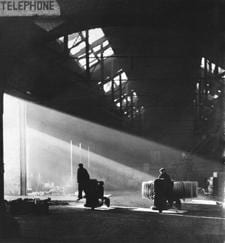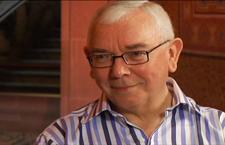
FORGED IN SELF-LOATHING. Terence Davies' Of Time and the City is an examination of the passage of time and changing place.
After such spell-binding masterpieces as Distant Voices, Still Lives and A Long Day Closes, British film director Terence Davies again returns to the Liverpool of his childhood with his first-ever documentary, Of Time and the City. The following is an excerpt from a conversation between Davies and Bell Lightbox artistic director Noah Cowan videotaped during the 2008 Toronto International Film Festival.
Part I
Part II
Part III:
Part IV:
Noah Cowan: Probably the most angry moment in your latest film, Of Time and the City, is when you talk about the parks of Liverpool and how men, for just a wink and a nod, are thrown in jail when far worse crimes are happening in different parts of the city. Then you remember that young boy in the trilogy, who very explicitly gazes at his male relatives and other boys in the street with a sexual longing he doesn’t quite know how to express. Talk to me about that evolution.
Terence Davies: It was a painful one. I left primary school in May or June and that summer was a warm one. I didn’t go to the pictures that particular day. I was looking out of the back of the house where these bricklayers were building a wall with just their jeans on. I suddenly knew that I shouldn’t look at someone like that. My happiness, my childhood was over like that. In an instant it was gone. I really believed that I was a devout Catholic. I went up to secondary school. Children are feral; they smell difference. These four lads saw their victim and they beat me up every day for four years. I didn’t tell a soul. It beats every kind of self-esteem out of you. You feel utterly despised.
When your psyche is forged through that, knowing you’re despised on a daily basis, and you know that whatever you’re feeling is, is wrong, I became even more devout. I literally prayed until my knees bled and no succour came. God never ever responded. He was probably out at Gap Kids knowing my luck.
Then at 22 I realized it was all a lie. I thought, “It’s just men in frocks” and I left. I read the whole of Dickens in a year. I read the whole of the Brontës in a year. I just read all the time. It just doesn’t replace that feeling of happiness; I’ve never been as happy since, and it doesn’t replace that feeling of utter self-loathing. Honestly I don’t like being me. I’d rather be somebody else, preferably very good-looking, very good body and really stupid because then the world is your lobster.
COWAN: And heterosexual too, or you don’t care about that?
DAVIES: Oh, absolutely, or perhaps bisexual.
COWAN: [Laughs] So you can have all the choices. It seems that cinema now, its function in the world, is to inspire passion in people, to inspire them through its ideas and to create emotions they’ve never had before. You speak about this very eloquently about your experiences with films from the ’50s especially. What emotions, what passions, what calls to action do you think your films should have on audiences?
DAVIES: What it does seem to have done is capture a zeitgeist, to my amazement. I hope it will entertain in the widest possible sense. But I hope more than anything that they’ll think no matter what their life has been that it’s worth it in the end because joy is worth having, even if it is transient, which it is. Suffering is never nice, but it too is transient. Just to be humane really.
I don’t think the film is saying that. I think it’s telling us about the nature of the passage of time and aging, but that passage in the end has to be worthwhile. If it’s not worthwhile we’ve almost betrayed ourselves in a way. It’s very easy to become bitter and envious. God knows I’m envious of men who are good-looking, I am. I have to fight with that daily. I would hope that it would give solace and at the end of the day it is worthwhile.
COWAN: Last but not least, for your fans, what might they expect next?
DAVIES: I want to do a romantic comedy, present day, with a ménage à trois, set in a fashion magazine and with a happy ending.
COWAN: Good God, what’s come over you?

 Why you can trust Xtra
Why you can trust Xtra


